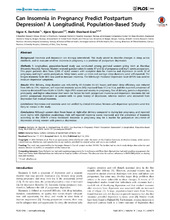| dc.description.abstract | Background: Insomnia and depression are strongly interrelated. This study aimed to describe changes in sleep across childbirth, and to evaluate whether insomnia in pregnancy is a predictor of postpartum depression. Methods: A longitudinal, population-based study was conducted among perinatal women giving birth at Akershus University Hospital, Norway. Women received questionnaires in weeks 17 and 32 of pregnancy and eight weeks postpartum. This paper presents data from 2,088 of 4,662 women with complete data for insomnia and depression in week 32 of pregnancy and eight weeks postpartum. Sleep times, wake-up times and average sleep durations were self-reported. The Bergen Insomnia Scale (BIS) was used to measure insomnia. The Edinburgh Postnatal Depression Scale (EPDS) was used to measure depressive symptoms. Results: After delivery, sleep duration was reduced by 49 minutes (to 6.5 hours), and mean sleep efficiency was reduced from 84% to 75%. However, self-reported insomnia scores (BIS) improved from 17.2 to 15.4, and the reported prevalence of insomnia decreased from 61.6% to 53.8%. High EPDS scores and anxiety in pregnancy, fear of delivery, previous depression, primiparity, and higher educational level were risk factors for both postpartum insomnia and depression. Insomnia did not predict postpartum depression in women with no prior history of depression, whereas women who recovered from depression had residual insomnia. Limitations: Depression and insomnia were not verified by clinical interviews. Women with depressive symptoms were less likely to remain in the study. Conclusions: Although women slept fewer hours at night after delivery compared to during late pregnancy, and reported more nights with nighttime awakenings, their self-reported insomnia scores improved, and the prevalence of insomnia according to the DSM-IV criteria decreased. Insomnia in pregnancy may be a marker for postpartum recurrence of depression among women with previous depression. | en_US |

